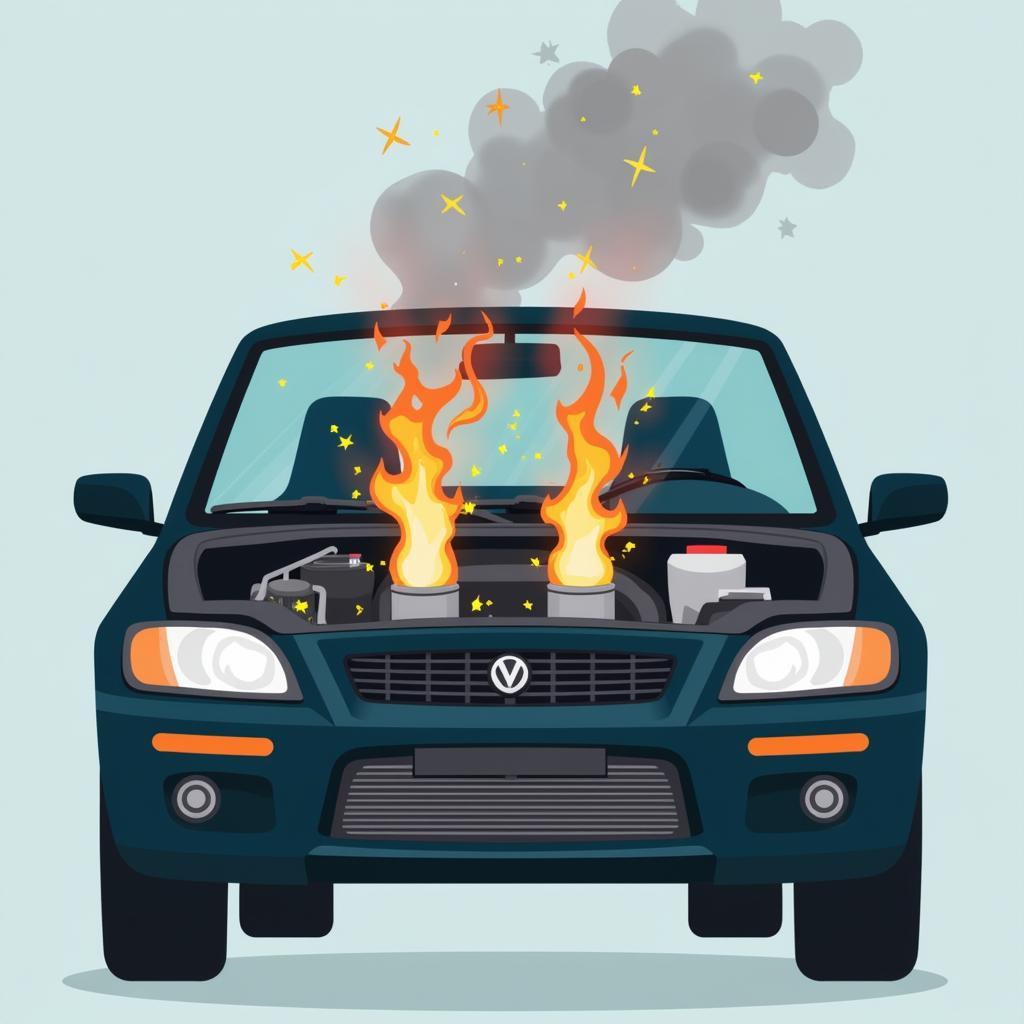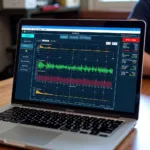The dreaded check engine light can strike fear into the heart of any driver. And when it does, one of the most common car diagnostic codes you might encounter is P0302. This code indicates a problem with cylinder 2 in your engine, specifically a misfire. But what does that mean, and how concerned should you be?
This comprehensive guide delves into everything you need to know about the P0302 code, from its causes and symptoms to detailed diagnosis and repair options. Whether you’re a seasoned mechanic or a car enthusiast looking to understand your vehicle better, this article will equip you with the knowledge to tackle this common engine trouble code.
What Does Code P0302 Mean?
In simple terms, the P0302 code signifies that your car’s computer has detected a misfire in cylinder 2. A misfire occurs when the air-fuel mixture in the cylinder fails to ignite properly or burns inconsistently. This disrupts the engine’s normal combustion cycle, leading to a loss of power, increased emissions, and potential damage if left unaddressed.
Common Symptoms of a P0302 Code
While the check engine light is the most apparent indicator, other symptoms might accompany a P0302 code, including:
- Rough idling: Your engine might vibrate excessively or feel unstable while idling.
- Engine hesitation: You might experience a momentary loss of power or a jerking sensation when accelerating.
- Reduced fuel economy: A misfiring cylinder can significantly decrease your car’s fuel efficiency.
- Engine stalling: In severe cases, the engine might stall unexpectedly, posing safety risks.
- Increased emissions: A noticeable increase in exhaust smoke or a foul smell from the exhaust pipe.
What Causes a P0302 Code?
Several factors can contribute to a P0302 code, ranging from relatively simple issues to more complex engine problems. Here’s a breakdown of the most common culprits:
1. Faulty Spark Plugs or Wires
Spark plugs are responsible for igniting the air-fuel mixture in the cylinders. Worn-out, fouled, or improperly gapped spark plugs can cause weak or inconsistent sparks, leading to misfires. Similarly, damaged or worn spark plug wires can disrupt the electrical current flow to the spark plug, resulting in misfires.
2. Ignition Coil Problems
The ignition coil provides the high voltage necessary for the spark plugs to fire. A failing ignition coil, often due to overheating or internal electrical issues, can disrupt the spark generation process, causing misfires in the affected cylinder.
3. Vacuum Leaks
Vacuum leaks occur when there are unintended openings in the engine’s intake manifold or vacuum hoses. These leaks disrupt the carefully calibrated air-fuel mixture, leading to lean conditions and potential misfires, especially in specific cylinders.
4. Fuel Injector Issues
Fuel injectors spray a precise amount of fuel into the cylinders for combustion. A clogged, dirty, or malfunctioning fuel injector in cylinder 2 can disrupt the fuel delivery, resulting in an improper air-fuel ratio and misfires.
5. Compression Issues
Proper compression within the cylinders is crucial for efficient combustion. Issues like worn piston rings, damaged valves, or a blown head gasket can lead to compression loss in cylinder 2, causing misfires.
6. Other Potential Causes
While less common, other potential causes of a P0302 code include:
- Faulty oxygen sensors
- Malfunctioning camshaft position sensor
- Problems with the engine control unit (ECU)
- Internal engine damage, such as a burnt valve or damaged piston
Diagnosing a P0302 Code
Accurately diagnosing the root cause of a P0302 code requires a systematic approach. Here’s a step-by-step guide to help you pinpoint the problem:
-
Read the Code: Begin by connecting a code reader car diagnostic tool to your car’s OBD-II port. This will retrieve the stored trouble codes, confirming the P0302 code and any other related codes.
-
Inspect the Spark Plugs and Wires: Visually inspect the spark plugs in cylinder 2 for signs of wear, fouling, or damage. Check the spark plug wires for cracks, burns, or loose connections.
-
Check for Vacuum Leaks: Listen for hissing sounds coming from the engine bay, indicating potential vacuum leaks. Inspect vacuum hoses for cracks, splits, or loose connections.
-
Test the Ignition Coil: Use a multimeter to test the resistance of the ignition coil for cylinder 2. Compare the readings to the manufacturer’s specifications to determine if the coil is faulty.
-
Inspect the Fuel Injector: Check the fuel injector in cylinder 2 for signs of clogging or leaks. You can also use a test light to verify if the injector is receiving power and ground signals.
-
Perform a Compression Test: If the previous steps haven’t revealed the issue, perform a compression test on cylinder 2. This test measures the pressure inside the cylinder during the compression stroke, helping identify potential mechanical problems.
Fixing a P0302 Code
Once you’ve identified the root cause of the P0302 code, you can proceed with the appropriate repair. Here are some common fixes based on the potential causes:
-
Replace Faulty Spark Plugs or Wires: Install new spark plugs and wires if the old ones show signs of wear or damage.
-
Replace the Ignition Coil: If the ignition coil is faulty, replace it with a new one.
-
Repair Vacuum Leaks: Seal any leaks in the intake manifold, vacuum hoses, or related components.
-
Clean or Replace Fuel Injectors: Clean the fuel injectors using a fuel injector cleaning kit. If cleaning doesn’t solve the problem, replace the faulty injector.
-
Address Compression Issues: Repairing compression issues often involves more extensive engine work, such as replacing piston rings, valves, or even the entire cylinder head.
How Much Does It Cost to Fix Code P0302?
The cost of fixing a P0302 code can vary significantly depending on the underlying cause, car make and model, labor costs, and whether you choose to DIY or hire a mechanic. Here’s a general estimate:
- Spark Plugs and Wires: $20 – $100 (DIY) or $50 – $200 (Mechanic)
- Ignition Coil: $50 – $200 (DIY) or $100 – $400 (Mechanic)
- Vacuum Leak Repair: $100 – $300 (Mechanic)
- Fuel Injector Cleaning: $50 – $150 (DIY) or $100 – $300 (Mechanic)
- Fuel Injector Replacement: $150 – $500 (DIY) or $300 – $800 (Mechanic)
- Compression Issue Repair: $500 – $3000+ (Mechanic)
Can I Drive with a P0302 Code?
While you might be tempted to continue driving with a P0302 code, it’s not recommended. Driving with a misfiring cylinder can lead to more severe engine damage over time, potentially resulting in costly repairs. If you must drive, do so cautiously and address the issue as soon as possible.
Preventing Future P0302 Codes
Regular car maintenance is crucial for preventing future P0302 codes. Follow your car manufacturer’s recommended maintenance schedule for spark plug replacements, air filter changes, and fuel system cleaning. Regularly inspect vacuum hoses for signs of wear and tear.
Conclusion
Understanding car diagnostic codes is essential for any car owner. By recognizing the symptoms and potential causes of a P0302 code, you can take proactive steps to diagnose and repair the issue, ensuring your car runs smoothly and safely. Remember, a little knowledge and timely action can save you from costly repairs and headaches down the road.
FAQs About Car Diagnostic Code P0302
1. Can a bad oxygen sensor cause a P0302 code?
While a faulty oxygen sensor can affect the air-fuel mixture, it’s less likely to cause a cylinder-specific misfire like P0302. However, it’s worth checking the oxygen sensor if other potential causes have been ruled out.
2. Will a P0302 code clear itself?
In some cases, a P0302 code might clear itself after a few driving cycles if the issue was temporary, such as bad fuel. However, it’s best to diagnose and address the underlying cause to prevent further problems.
3. How do I know if my spark plugs need replacing?
Inspect your spark plugs for signs of wear, such as worn electrodes, excessive deposits, or damage. Consult your car’s owner’s manual for the recommended spark plug replacement interval.
4. Can I use a fuel additive to clean my fuel injectors?
Yes, using a quality fuel injector cleaner can help remove deposits and improve fuel injector performance. However, it’s essential to choose a reputable brand and follow the instructions carefully.
5. Can a P0302 code damage my catalytic converter?
Yes, driving with a misfiring cylinder for extended periods can damage the catalytic converter, leading to expensive repairs.
Other Helpful Resources
For more information on car diagnostic codes and troubleshooting tips, visit these helpful resources:
Need help with your car’s P0302 code or other diagnostic issues? Contact our expert team via WhatsApp: +1(641)206-8880 or Email: [email protected]. We’re available 24/7 to assist you.


